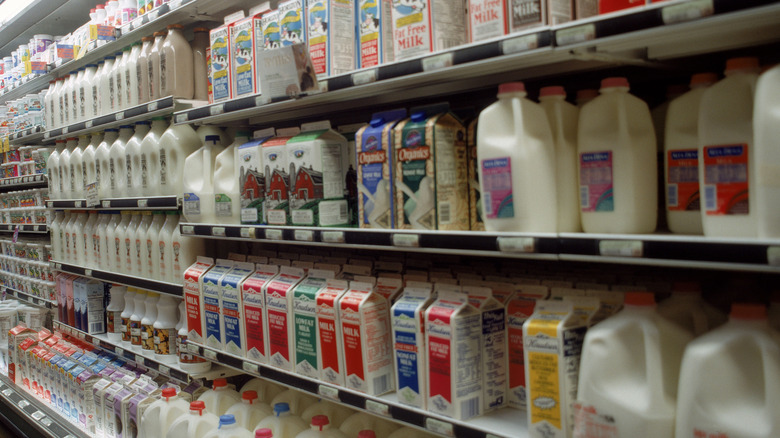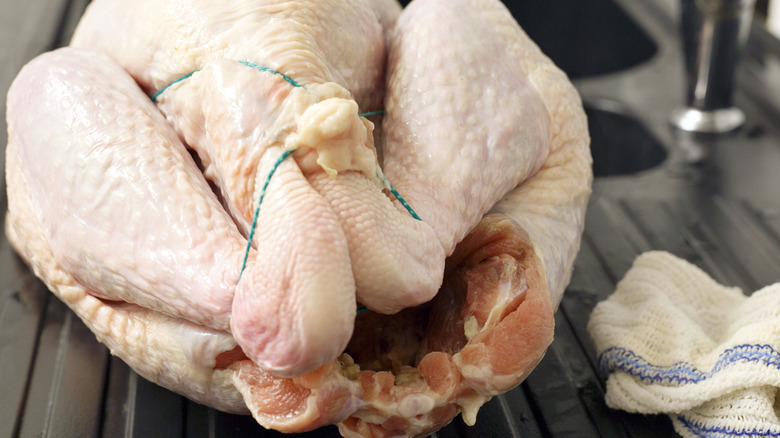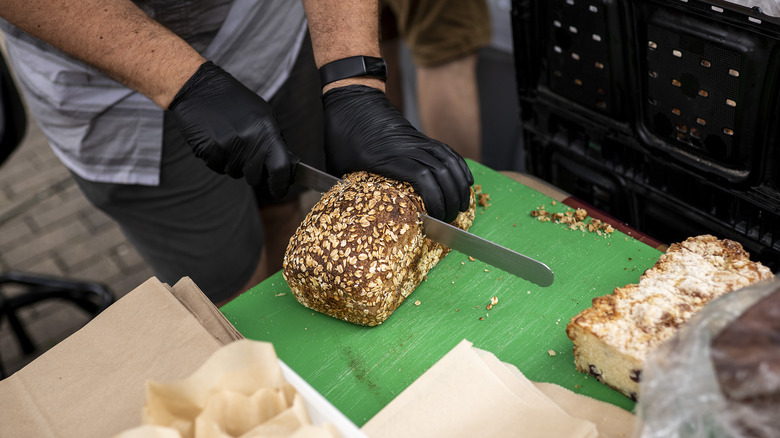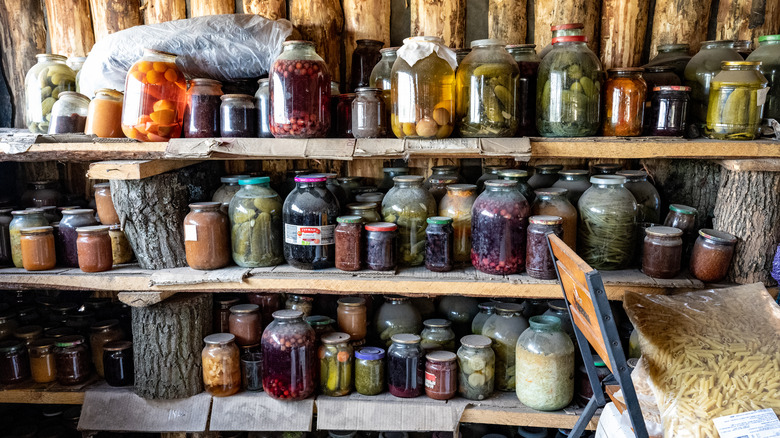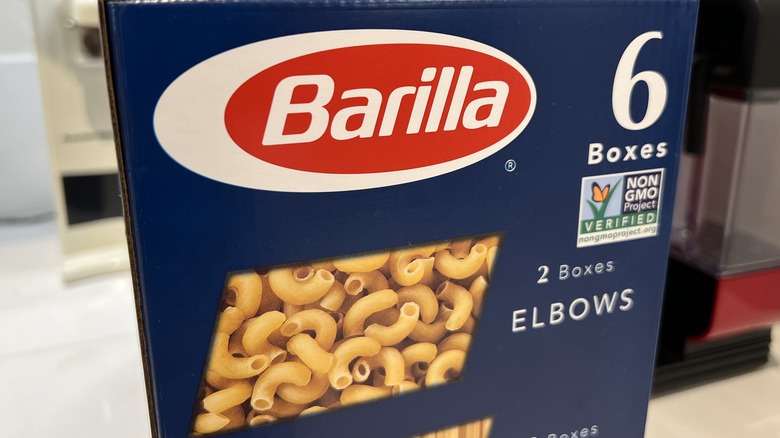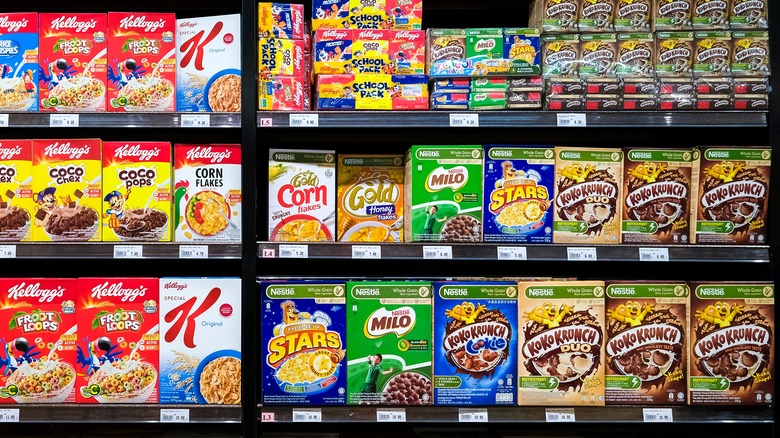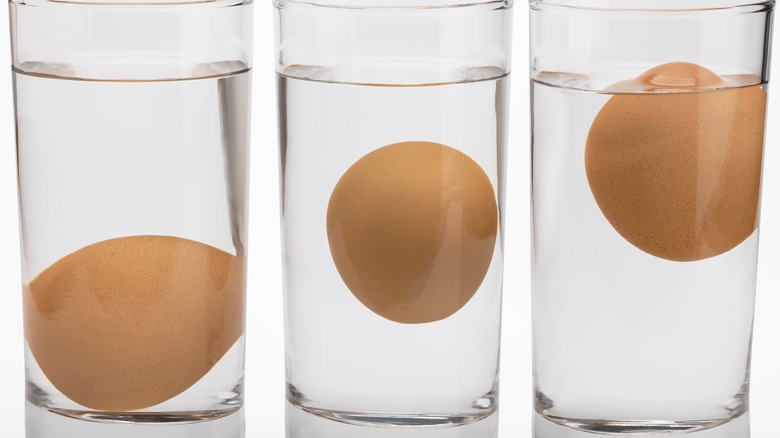Tell-Tale Signs These Foods Aren't Safe To Eat
If you've ever succumbed to food poisoning at one time or another, you know it's no joke. Depending on the bacteria that caused it, symptoms include vomiting, diarrhea, bloating, and fatigue. Knowing the signs of foods that have gone bad can help you understand when that cheese you bought a week ago is good to eat and when you should throw it out.
The U.S. Department of Agriculture (USDA) limits the shelf life of every food you eat. Many foods with long shelf lives have a best by date, which is the date at which the taste and texture of the food are optimal. Foods also typically have an expiration date. While some foods can be eaten after the expiration date, others might not even make it to the date when stored in less-than-optimal conditions.
Save yourself a stomachache by knowing when your dairy, meat, veggies, bread, dry goods, and eggs are expired. Find out how to store specific foods to make sure they stay fresh longer.
Signs that your milk has expired
There's no better way to start the day than with a crunchy breakfast, so you grab a refreshing bowl of your favorite cereal. Without checking the date of the milk, you pour it on. It comes out chunky and fills your house with a sour smell. You've just encountered the most tell-tale signs that your milk has exceeded its expiration date.
Cow's milk is a standard dairy product that most homes stock their fridges with regularly. According to the USDA, dairy products like milk can be refrigerated for seven days. However, depending on the conditions, they might last longer. Undeniably Dairy also notes that milk should only sit out for up to two hours at room temperature. All commercial milk products come from the grocery store with an expiration date. However, depending on conditions, milk can last longer or shorter than that date.
In addition to a chunky consistency and smell, spoiled milk will also have an acidic or sour taste due to the overgrowth of bacteria changing the natural sweetness, per Healthline. Unpasteurized milk can also begin to ferment. The first thing you'll want to do if you think milk has expired is sniff it. Missouri Poison Control noted that a small sip of spoiled milk doesn't typically cause harm, but a large quantity could lead to stomach distress that resolves in 12 to 24 hours.
Vegetables and fruits that aren't safe to eat
Some foods scream they are spoiled with their smell or look, but others can be more discreet about the fact that their time in your refrigerator has ended. Fruits and vegetables are among the ninja-like foods when they're coming to the end of their shelf life. But that doesn't mean they don't offer you signs to chuck them in the trash.
Color is one of the most obvious clues that fruits and vegetables have gone bad. Many types of fruit will start to brown. For example, the romaine lettuce tips will wilt and brown. The USDA also notes that fruits and vegetables can feel mushy or slimy. This is true of carrots. They can get soft, rubbery, and slimy when they expire. As a fruit breaks down, it also releases ethylene, which produces a foul odor.
Depending on the fruit or vegetable, it can have a shelf life of a few days to several weeks. According to WebMD, storing fruits and vegetables in your refrigerator's crisper can help extend their lives, rather than just letting them sit out on the counter. You can also use fruits like apples and veggies like cucumbers by cutting off the rotten parts, states Business Insider.
Meat that needs to be thrown out
Raw meat is one area you want to avoid playing with when it comes to expired food. Consuming spoiled meat can lead to severe gastrointestinal distress, like vomiting and diarrhea. Before you cook up that ground beef you bought a few days ago, looking for signs of spoilage is vital. According to the Australian Institute of Food Safety, meat will give you cues in the look, touch, and smell that it's rancid.
Red meat that's hit the end of its life will take on a brownish or purple color; chicken is going to go from pink to gray. Healthline also notes that expired meat will have a distinct texture that's slimy or sticky. Chicken also loses its firmness. Expired meat with a buildup of bacteria has a putrid or rotten smell. If you've noticed any of these in your meat, it's better to err on the side of caution and toss it.
All meat has an expiration date that you can check. For fresh meat, Foodsafety.gov notes that hamburger and chicken can only last one to two days in the fridge and about four months in the freezer. Pork and ham have a longer shelf life in the fridge: at three to five days, but they can go as long as 12 months in the freezer. Just make sure they pass the sniff and look test before cooking them.
When to toss lunch meats
Another common meat that you'll find in most refrigerators is lunch meat. Also known as processed meats or cold cuts, these delicious meats are smoked or pre-cooked and contain various chemicals. They often come packaged with an expiration date, but you might also enjoy sliced meats from the deli. Knowing what to look for when it comes to spoiled lunch meat can save you a belly ache and time off work.
The shelf life of your deli meats varies based on whether they are wrapped at the deli counter or in a sealed package, according to McLean Meats. Sliced deli meats are in the fridge for about three to five days. Dryer meats like salami can last longer due to the curing process. The USDA states that lunch meat that has yet to be opened can be stored for two weeks before opening. But you can prolong the life of lunch meat by months if you freeze it when stocking up.
Today advises to follow the expiration date even if the cold cuts look and smell fine. Lunch meat can be a victim of listeria, which can trick the smell and look test, so it's crucial to trash it after a few days. Of course, your best bet is to freeze it. But if you open the package on a Sunday, use it by Thursday at the latest.
Knowing when cheese has reached the end of its life
Perhaps you like to keep your fridge stocked with your favorite gouda, or maybe it's cottage cheese that makes your heart sing. Whichever the case, there's nothing worse than grabbing your favorite cheese out of the refrigerator only to see the signs it's expired.
The shelf life of cheese can be harder to remember since it varies. According to Healthline, the best way to know if your block of cheese or part of your cheese has expired is to look at the date on the package. You can also inspect your cheese for signs of mold by looking for blue or green specks. If you see a moldy area, cut it off along with about an additional inch of your hard cheese. Any mold on a soft cheese like cottage cheese or ricotta means it's not edible. While some cheeses are just stinky, the National Library of Medicine notes that a chlorine-like smell can indicate that the cheese is overripe and ready to head to the trash.
Your best bet for a cheese that looks and smells fine is to consider the shelf life. All Recipes notes that hard cheese, like cheddar, can last up to eight weeks after opening in the fridge. Soft cheeses, like mozzarella, have a much shorter shelf life and can expire in seven to ten days. Look for mold and dryness if you think it's bad. If in doubt, throw it away.
Shelf life of bread
Baked goods are one of the staples of life. You use bread for everything from pudding to making your favorite double-decker sandwich. But like most delicious things, bread doesn't last forever on your counter.
The texture is one of the most obvious hints that bread needs to be pitched. Stale bread gets hard, and we mean throw-it-on-the-ground, brick-like hard. And that's not the crunch you're really looking for. It may also taste a little off as green specks of mold start to take over, according to Healthline.
The duration of how long your bread takes to succumb to the bacteria and mold that make it spoil depends on the type of bread. Fresh breads from your local bakery aren't full of preservatives, so you typically have three to four days before they go bad. Bagged bread at the store can last a little longer due to the added preservatives; you might have your bagged bread on the counter last as long as a week before it starts to mold.
However, according to Busby's Bakery Shop, putting your bread in the freezer can give it more shelf life. With it in the freezer, you can get as much as three months out of your loaf of bread. Just make sure you allow it to defrost it or warm it up in the oven or toaster before eating.
Signs that show canned goods aren't safe
When you think there might be a food shortage or other disaster, there's a good reason that people reach for canned goods. These have a long shelf life, unmatched by other foods in your pantry. But even precious cans of food can go bad eventually. This is especially true if they weren't stored at the optimal temperature or if other elements have come into play.
According to the University of Minnesota Extension, canned goods give you particular signs if they succumb to spoilage. Examine any cans for rust, bad dents, leaking, or bulging. This is a sign that the can might have been unsealed. Ensure that the lids of canned goods in glass jars have yet to pop. And the most tell-tale sign is a foul odor if you open it. If you notice any of these signs, glove up and throw away the canned goods. Eating expired canned goods can result in botulism, a potentially fatal illness from the bacteria Clostridium botulinum.
The USDA states that canned goods for low-acid foods like canned meat and veggies can last up to five years. Those with high acidity, like canned tomatoes, have a shorter shelf life of about 18 months. You'll also want to store your canned goods in a cool, dry place and rotate the oldest to use them first.
Knowing when pasta has spoiled
Boxed pasta is one of those foods with a long shelf life in your pantry. The Food Network notes that dry pasta can keep for two years in your pantry. You can keep it even longer if it doesn't have a dry or brittle texture and doesn't smell rotten since it's one of those foods you can typically use past the expiration date with no issues. That same truth isn't to be said for cooked pasta, however.
Healthline states that any cooked pasta should be stored in the fridge. The water you add when you boil it makes it susceptible to mold and bacteria growth, especially when you add sauce. Depending on the type of pasta, it lasts in the refrigerator for at most five days. Fresh, store-bought wheat pasta can only last for about three days. If you aren't sure exactly how long it's been, throw away slimy, gooey, or grayish pasta.
Bacillus cereus is the most common type of food poisoning from eating expired pasta. This can lead to gastrointestinal distress and even death, per a case study in the Journal of Clinical Microbiology.
Hints that your cereals shouldn't be eaten
You might think boxed cereals can last forever, but they can't. According to the USDA, cereals can be stored in the pantry for a maximum of 12 months unopened. However, when you open them, this time reduces to three months.
Sharon Palmer, RDN of The Plant Powered Dietician told Today that not all cereals are created equal. Some cereals are more likely to go bad than others. "Cereals with fat are more prone to rancidity," she explained. This includes cereals that include whole grains and those that have nuts in them. Once cereals have started to turn, you'll notice a rancid odor and an oily appearance. While eating these cereals won't cause you as much distress as eating bad pasta or meat, they will most likely leave a bad taste in your mouth.
The article also noted that it matters where you store your cereals, to ensure that they have the longest shelf life. Much like canned goods, they crave a dry, cool place.
Clues that cooking oils have expired
You've pulled an old, unopened oil bottle from your pantry, and you're wondering if you can use it since you're in a pinch. Oil doesn't last forever. As R.L. King, chef of New York's Bar Gonzo, explained (via Insider), "Oil that is not opened and stored in a dry, cool place can last up to two years. Once you have opened the oil, it should be used in the first two to three months. However, a well produced and high-quality product could last up to one year, again stored in a dry cool place and lid tightly sealed."
Expired oil will have more than just an expiration date that's past; it will also have a very rancid taste. At first, it will become a little sour, but the taste worsens with time. You can also give it a sniff test for a strong or foul odor. Expired oil also has a cloudy or sticky appearance, per Dar Pro Solutions. Keep an eye out for a film on top, too.
While expired oil doesn't typically make you sick, it will likely make you spit out your food in disgust.
Rice has reached the end of its shelf life
Not all rice is created equal, due to the fat content in this family staple. Dry rice has a long shelf life, like pasta and cereal. According to Healthline, brown rice turns rancid before white rice and expires after about six months. White rice, on the other hand, has a much longer shelf life of up to two years. This is when rice is stored at room temperature; changing the temperature it's stored at can affect how long it takes before rice goes bad.
Rice can give you subtle and not-so-subtle hints that it's expired. First off, expired rice smells unpleasant, so give any rice you're unsure about a sniff test. It might also get mold, which looks like blue or black spots on the grains. Some rice can even have bugs crawling within the container.
Cooking your rice is going to change its shelf life. Adding water requires you to refrigerate the rice. According to The Pioneer Woman, it will last about a week in the fridge. Putting your cooked rice in an airtight container and throwing it in the freezer gives you about six months before you need to eat it.
Tell-tale signs that your eggs aren't safe
The USDA notes that eggs can expire and lose their quality over time as the white and yolk respond to oxygen penetrating the shell. Medical News Today points out that eggs that have gone rotten have a pungent, foul odor when the shell is cracked.
If you aren't willing to take your chances, one surefire way to tell if your egg has gone bad is to do the float test. The USDA notes that as eggs age, they become buoyant in water. Therefore, if you put an old egg in water, it will float to the top. Eggs that must be used immediately will stay at the bottom but point up. Those that are fresh are going to remain secure at the bottom. Rotten eggs might also have a powdery or slimy shell.
Under proper refrigeration conditions, eggs can last about five weeks.


